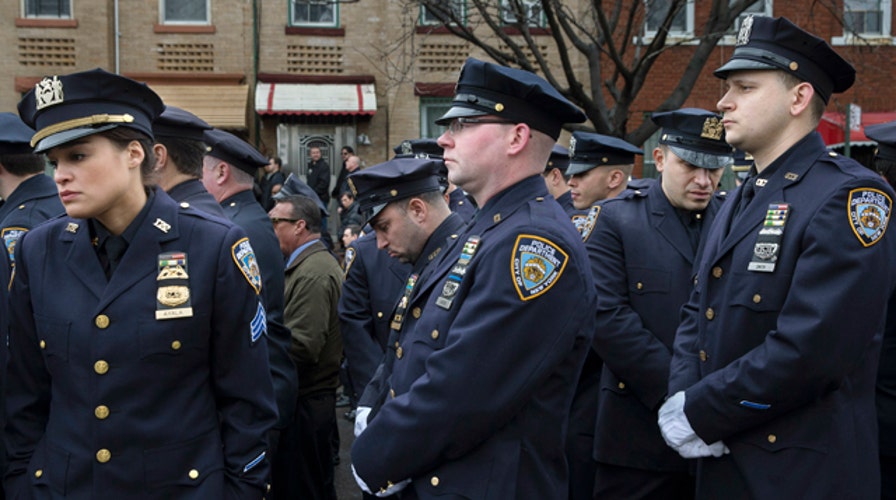Should attacks on police be prosecuted as hate crimes?
Union wants law enforcement officials protected under hate crime laws
This is a rush transcript from "On the Record," January 6, 2015. This copy may not be in its final form and may be updated.
GRETA VAN SUSTEREN, FOX NEWS HOST: For months, and across the nation, we have seen antipolice protests, and most recently the assassination in broad daylight of two NYPD officers sitting in their squad car. And now a national police union is calling on Congress to expand federal hate crime laws. The union wants those laws to include the targeted assassinations of police.
Joining us, Fraternal Order of Police president, Chuck Canterbury. Good evening, sir.
CHUCK CANTERBURY, PRESIDENT, FRATERNAL ORDER OF POLICE: Good evening.
VAN SUSTEREN: So you want to expand the federal hate law crime that was -- to include targeted assassinations of police officers, is that right?
CANTERBURY: Absolutely, Greta. There's been nine assassinations in 2014, and as we're saying, enough is enough.
VAN SUSTEREN: What do you hope to achieve by it? And an assassination means to me a death, and the maximum penalty -- I mean, the penalty right now when you shoot someone and kill someone, you know, in some states, is the death penalty, some life without parole. So I'm not sure you get any sort of enhanced punishment. If the -- if you wanted to put it as part of the hate crime nonfatal injuries, like shooting someone who survives, and gets sort of a bump up an extra five or 10 years on top of it, that might work. That might be to your benefit.
CANTERBURY: That's not something we would oppose. But what we believe this will do is elevate the assassination of a police officer into groups that are already protected under the hate crime legislation. And it would give a more uniformed punishment across the entire country for people that commit such a heinous crime. If you will kill a police officer, you will kill anybody.
VAN SUSTEREN: That's, indeed, true. I have been out to that wall where there are 20,000 names etched into the wall at the memorial for law enforcement who were shot in the course of duty in the line of duty. So, that is without any doubt but, you know, it's incredible the amount of violence committed on police officers.
But, let me ask you about another issue. That's other police shooting, of course, and that happened -- another police shooting that happened in New York City. That happened last night. The NYPD now has three people in custody after two police officers were shot in the Bronx. Now, the officers were shot while searching for armed robbery suspects. Tonight, both officers are in stable condition. That's the good news, and are expected to survive. That's even better news.
The father of one of the officers says his son was not happy about getting a hospital visit from Mayor de Blasio. Mr. Canterbury, your thoughts about that the mayor of New York is in such hot water with the police. Is there anything he can do to restore his relationship with them?
CANTERBURY: Well, I think the most important thing is that he needs to start meaningful talks with the police union and they don't need to be public talks. These need to be private talks between him and the police union. And he has to demonstrate some trust in his law enforcement. He has not done that. He ran a campaign of police reform and every comment that he has made has incited the men and women of the New York Police Department. And with four of them being shot in just the last two weeks, I think the mayor needs to take a serious look at his reaction. His public reaction is to be disappointed that they turned their backs. Well, you know, I just received an email a minute ago from an individual who said respect is earned. He has not earned the respect of that police department. They deserve it. That is a police department that's greatly reduced crime in the largest city in the United States. And they did it with pride and did it to the satisfaction of two previous mayors. So, he has got a lot of work to do. And the only way he is going to do that is to sit down and talk privately with that police union and work with them to -- in a collaborative effort rather than in a war in the media.
VAN SUSTEREN: You know, I don't know, if I were a New York City police officer, I don't know if I could be convinced. I don't know what he could do. If you run on a campaign like that and you have made the statement that he has, I just don't know how you possibly, possibly recovers from that well,
CANTERBURY: I think it's going to be extremely difficult. I mean, to be respected and judged on the merits of his actions rather than his public comments. Police officers don't do this job to get patted on the back. They do the job because they join this as a career field, and they do it because they love what they do. They don't expect to be patted on the back. They also don't expect to be kicked when they are down.
VAN SUSTEREN: I think it would be very hard for him to convince them that he has the respect that they do not believe that he has for them. So we will see.
Mr. Canterbury, thanks, sir.

